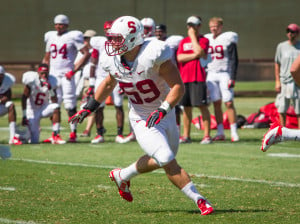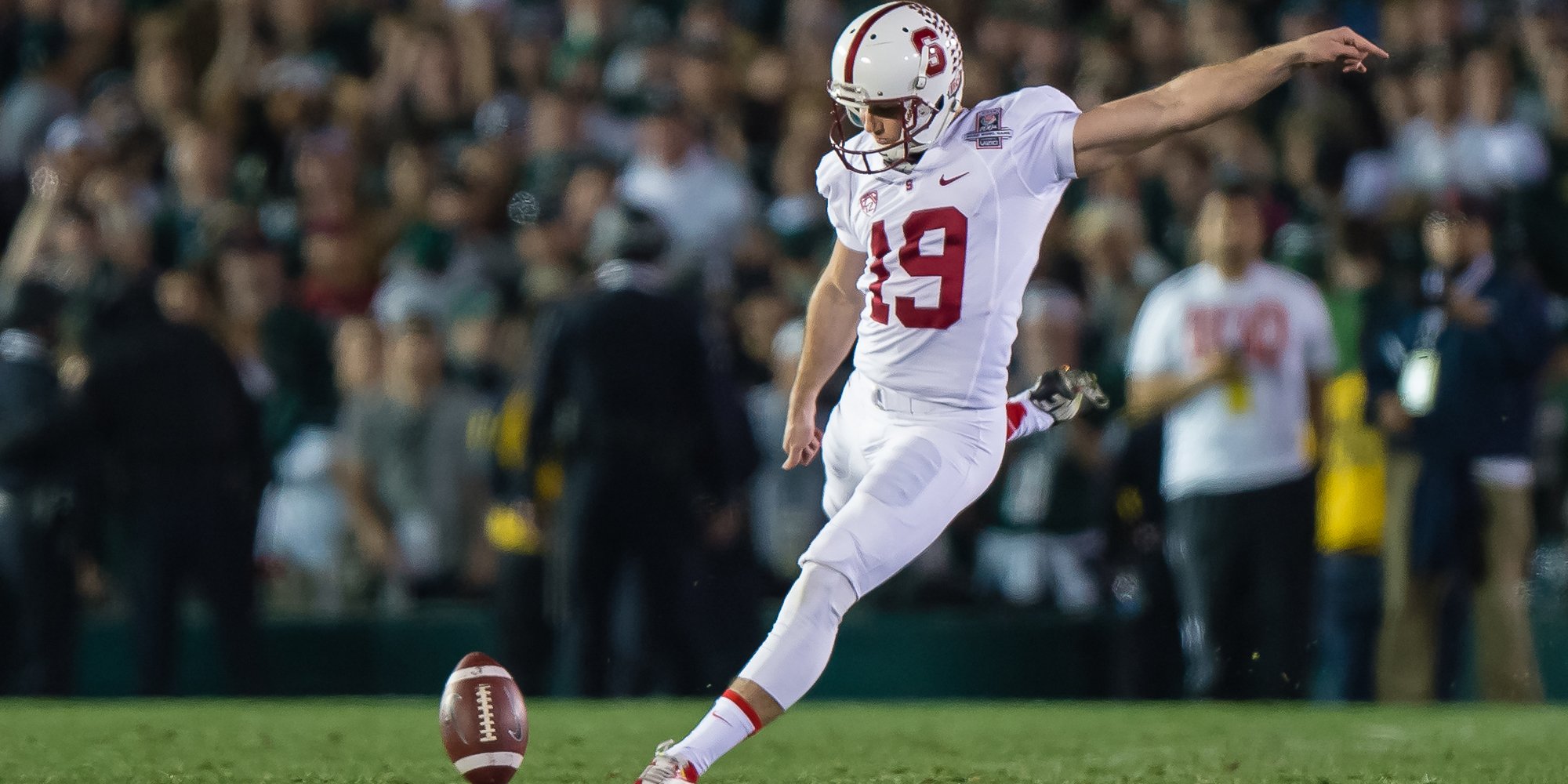Almost across the board, Stanford’s special teams became a force to be reckoned with in 2013, compiling some of the best stats in the country and a slew of highlight-reel plays.
But even though Cardinal fans have become accustomed to suffocating kick coverage and electric Ty Montgomery returns, there’s one vital cog on special teams whose contributions have been acknowledged much less frequently.
Jordan Williamson made 18 of his 22 field goal attempts last year. He’s now provided the winning margin in a Pac-12 Championship Game, a Rose Bowl and two consecutive top-five victories against Oregon. Over his career, he’s put more points on the board than Stepfan Taylor or Toby Gerhart, and with a field goal and a PAT this season, he’ll become the leading scorer in Stanford football history.
And yet there are still people with long memories, still people who — two and a half years after the Fiesta Bowl — get nervous whenever they see the Cardinal line up for a field goal.
Jordan Williamson is not one of those people. Neither is David Shaw.
“Everybody’s got scars, and you either keep picking them and letting them keep bleed, or you let them scar over and you move on,” Shaw said. “He’s grown so much. He’s matured so much. He’s become one of the best kickoff guys in the country, and when he’s healthy — as he [was] the majority of the time last year — he’s as good as anybody.”
Williamson was perfect on field goals shorter than 37 yards last year. Of his four misses, one was blocked and two were from more than 50 yards out. Only three qualifying Pac-12 kickers posted a higher field goal percentage than Williamson, and only one had more makes.
All of that considered, Cardinal fans should have a whole lot of confidence in the fifth-year senior. The coaching staff, for one, has noted Williamson’s mental resilience.
“Jordan’s done a good job of just being able to learn from a miss, and then move on from it,” said special teams coach Pete Alamar. “You can’t cumulatively let that stuff get on top of you. If you do — geez, you’ve got no chance.”
Alamar noted that the same applies to many players on the football field — whether it’s to a corner who gave up a big gain or to a long snapper who let one get away.
Of course, the outside criticism of kickers always seems to linger a bit longer. But Williamson has mastered the art of tuning it out.
“You always hear stuff. I think every kicker does though, you know?” Williamson said. “And it’s just the nature of the position. You’ve just got to block it out, trust yourself and trust your swing.”
Montgomery also places a lot of trust in his preparation, which Alamar thought was a big reason why he sped his way to the Jet Award as college football’s top kick returner in 2013. Though Montgomery’s explosiveness and power played a decisive role in that success — and, Alamar hinted, are areas that the senior has actually improved in this offseason — the work he puts in behind closed doors contributes a lot as well.
“He’s become a great student of the game,” Alamar said. “He spends a lot of time. He watches kickers kick. He looks at how they line up…Not just of where the holes are going to be, but, ‘How does this guy cover? How does this kicker tend to kick? Where is the ball going? Can I get a jump on it?’ Ty studies all that stuff, and that works in his favor.”
Montgomery has also taken snaps as a punt returner during training camp, where he’s expected to alternate with junior Barry J. Sanders. As if that two-headed monster wasn’t elusive enough, shifty freshman Christian McCaffrey could be in the mix as well if he isn’t redshirted.
Montgomery and Williamson aren’t the only known commodities who will be front and center on special teams this season. Fifth-year senior Ben Rhyne, a biomechanical engineering major and Pac-12 Football Scholar-Athlete of the Year, will start at punter for the second straight season, while fifth-year senior linebacker A.J. Tarpley will be one of several veterans anchoring the coverage units.

The Cardinal’s model is to build each of its special teams units around a few proven players; last season, for example, the front line on punt coverage consisted of Stanford’s top four inside linebackers. Stanford does lose Shayne Skov and coverage specialist Jarek Lancaster, but Alamar listed a bevy of seniors who are coming back: James Vaughters, Lee Ward, Joe Hemschoot, Patrick Skov and Kyle Olugbode.
Around that core, the coaching staff is beginning to slot in younger players who haven’t seen the field as much, such as junior inside linebacker Craig Jones, who played in only one game last year but has won a spot on kick coverage.
“We believe that every linebacker who’s going to play in the game should be able to contribute on special teams,” Tarpley said. “It’s the fastest way that you can show the coaches, yourself and your teammates, that you’re capable of playing at this level.”
Tarpley remembers that the low barrier to entry allowed him to first break through on special teams several years ago. And though it’s only natural for a young player’s focus to be elsewhere, Tarpley says that Alamar drives the point home during the team’s three special teams periods per day.
“Coach Alamar will tell you that his time is very valuable, which is very true,” Tarpley added. “And he knows that everyone is thinking about the offense and the defense, because that’s the big picture, that’s what gets the media attention. But special teams are just as important.”
Contact Joseph Beyda at jbeyda ‘at’ stanford.edu.
2014 Stanford Football Preview Series
[ubergrid id=1087349]
